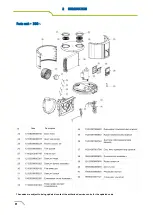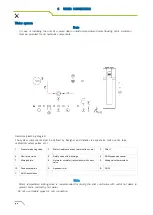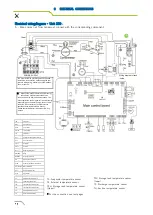
Possible installations
The unit must be installed inside the building, preferably in a technical room or a laundry room or a garage.
At any rate, it is always preferable to avoid installing the unit near bedrooms or in rooms that must be protected from
noise.
Outdoor installation is prohibited, as well as installation in places subject to external weather.
Examples below refer to the
190S
version. For the
300S
version, the expulsion and intake connections are inverted.
INTAKE AND EXPULSION DUCTS (recommended)
Installation with an intake duct and free expulsion is recom-
mended if there is a desire to use the air expelled by the
unit, cold dehumidified air (5-10°C colder than the intake
air), to cool the room.
The unit must be installed preferably in a room that does
not require heating, because the unit releases cold air into
the environment and it would increase the cost of heating
that room.
The unit must be installed in a room with a minimum volu-
me greater than 15m2. The expulsion air flow must be gua-
ranteed and cannot be blocked. It is necessary that the
vents be correctly sized.
Channelling the intake and expulsion through ducts allows the unit to function with air taken from outside the house.
Heat is extracted from the outdoor air, and used as a source for the heat pump.
Later this same air is expelled outside the building.
Therefore, unit operation does not cause an increase in heating requirements in the home. It is necessary to fit the sy-
stem with correctly sized pipes in relation to the available pressure head supplied by the unit.
INTAKE DUCTS (conditioned)
EXPULSION DUCTS (conditioned)
In this particular type of installation, the unit takes in air
from the room where it is installed, extracts the heat and
then expels that air outside the house.
The unit must be installed in a room with suitable openings
to allow the correct flow of air into the unit, which would
prevent the air pressure in the room from falling. The unit
must be installed in a room with a minimum volume grea-
ter than 15m2.
7
AERAULIC CONNECTIONS
















































